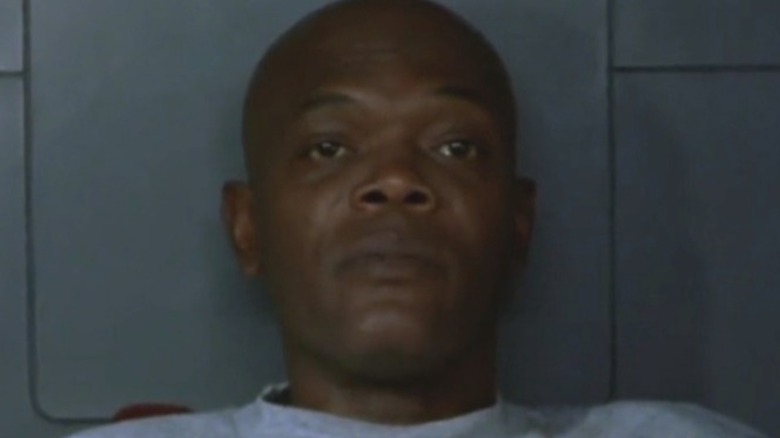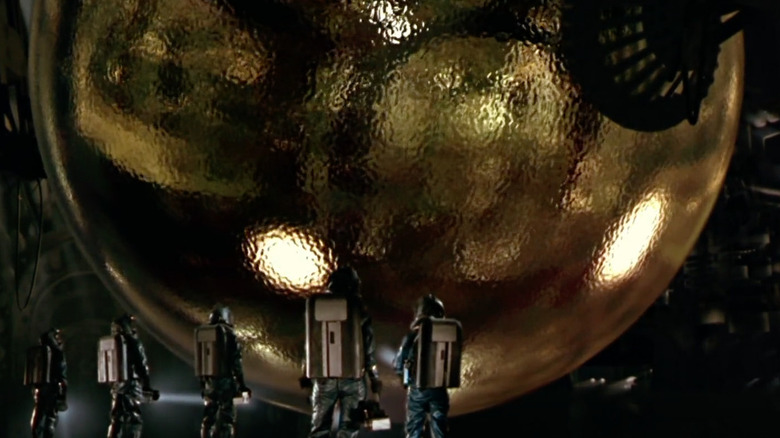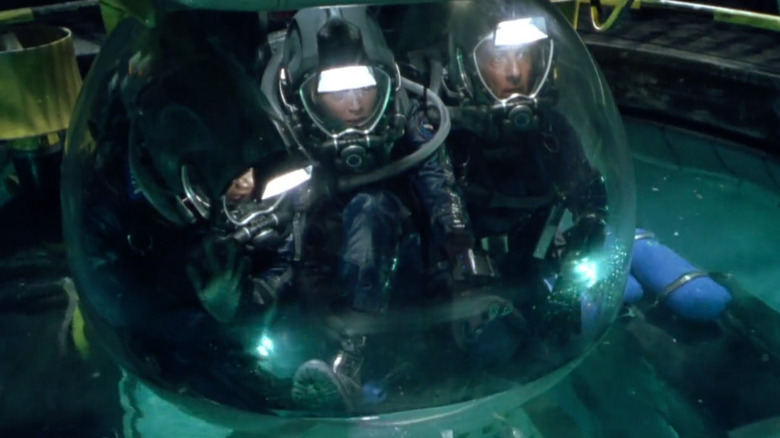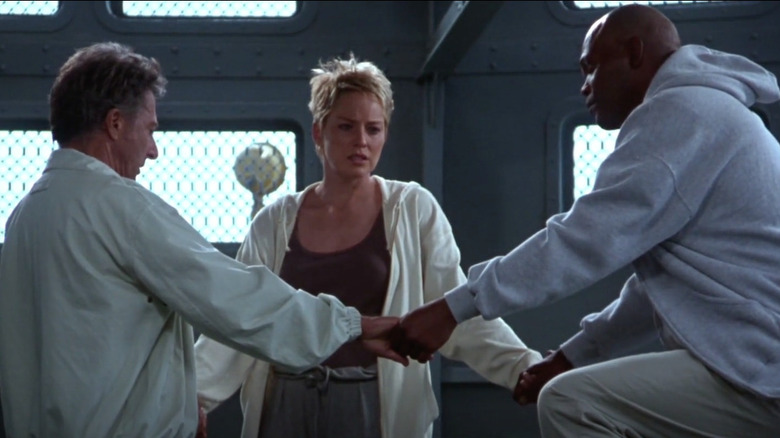The Ending Of Sphere Explained
The 1998 science-fiction thriller "Sphere" — which is based on the 1987 novel of the same name by Michael Crichton — follows a team of experts who are called in after the discovery of a mysterious spaceship on the floor of the Pacific Ocean. The team of specialists includes psychologist Dr. Norman Goodman (Dustin Hoffman), marine biologist Dr. Beth Halperin (Sharon Stone), mathematician Dr. Harry Adams (Samuel L. Jackson), astrophysicist Dr. Ted Fielding (Liev Schreiber), and U.S. Navy Captain Harold Barnes (Peter Coyote).
Through the course of the film, the team realizes that the spaceship is a human vessel that has been on the ocean floor for nearly 300 years but originated from the future. It ended up where it is after inadvertently going through a black hole and traveling to the 1700s. They also find an alien entity in the form of a giant golden ball on board.
It is then revealed that anyone who enters the sphere gains the power to manifest their subconscious fantasies, dreams, and fears. After Harry enters the globe, several nightmarish creatures attack their underwater habitat and numerous team members are killed. The final survivors, Norman, Harry, and Beth, admit to entering the mysterious sphere, which granted them all powers. The three then escape in a mini-sub after Beth subconsciously detonates a bomb on the ocean floor.
Distrust, suspicion and paranoia run rampant as unexplained horrors begin to attack the crew
After the team makes their way to the ocean floor and explores the spacecraft and alien sphere, Harry Adams returns to the ship alone, overcome by curiosity, and enters the giant orb. Norman Goodman retrieves him, and shortly after, the team begins to receive messages from the sphere from someone called Jerry. Following this, numerous unexplained horrors emerge, including giant killer squid and lethal jellyfish, which kill several crew members. The team members begin to turn on each other as their numbers decline, and accusations are made on everyone. Finally, only Norman, Harry, and Beth Halperin remain as survivors.
Norman tries to reason with the alien through its messages and finds that it now states, "Stop calling me Jerry." He then learns that Harry incorrectly decoded the initial transmission and the entity's name is not Jerry but, in fact, Harry. With this new evidence, Beth and Norman agree that Harry is the culprit, and incapacitate him with an anesthetic while they await rescue. However, after Norman is attacked by snakes in his bathroom, Beth suspects that Norman also entered the sphere and considers him a threat. She locks him in a room with another dose of the anesthetic, threatening to flood the space if he doesn't inject himself.
This escalation of events gives us a glimpse into what must have happened on the futuristic ship that was originally carrying the alien sphere. As more crew members began to manifest horrors, paranoia ran rampant. Chances are that just like our team, their crew entered the sphere one by one, giving in to their distrust and suspicion and (either accidentally or intentionally) killed each other.
Do you control your fears, or do your fears control you?
After it's established that all three members have gained powers, Beth Halperin accidentally uses her subconscious ability to trigger explosives near their position. She admits, "I was just thinking about the explosives" and exasperatedly recalls, "I was thinking about wanting to die."
Although the three are able to make it to the mini-sub in order to escape, their combined anxiety causes them to hallucinate that they have been transported back to the spacecraft. Norman realizes that they are still in the mini-sub and breaks away from the illusion just in time to launch their vessel and outrun the underwater explosion.
For all intents and purposes, the sphere itself appears to be simply an object with no agenda or motive. Everything that has happened on the mission was a result of the crew members' own actions. They chose to enter the globe and gained powers that unwittingly manifested their fears and insecurities. They could have just as easily used these same abilities to create unicorns, or the cure for cancer, or interplanetary travel — but instead, we got giant squids, sea snakes, and a homicidal smack of jellyfish. It is only when Norman is able to break away from the darker parts of his psyche that he is able to see through the apparition that he himself created.
If you or anyone you know is having suicidal thoughts, please call the National Suicide Prevention Lifeline at 1-800-273-TALK (8255)
Just because you forget about your powers doesn't mean they forget about you
At the end of the movie, before the surviving members are debriefed by military intelligence, they decide to use their powers to forget what they just experienced. In doing so, they are able to keep the time loop intact where the spaceship from the future did not have any information about their exploits.
The problem with this plan however is that simply forgetting that you have this power, doesn't actually take it away. We saw multiple times that characters manifested things around them unknowingly. In fact, Norman doesn't even recall entering the sphere but still has the abilities that the object gave him. Instead of trying to control their influence or use it for good, all these three have done is allow their fellow crew members to die in vain, and leave their powers intact with no knowledge of how to control them — a recipe that will certainly lead to more disasters.
Before choosing to forget about what happened, Norman reminisces, "We were given this magic ball and it says 'Imagine what you will and you can have it', and we're so primitive, we have so many fears that we carry with us, that we manifest the worst in us rather than the best in us." This line succinctly lays out the entire thesis of the film. Humans have the incredible gift of imagination that we can use to create all types of wonders. But more often than not, instead of creating the best in us, we create the worst. Although we have accomplished incredible feats, in certain respects, our species is still too primitive for us to overcome our inadequacies and become the best version of humanity.



